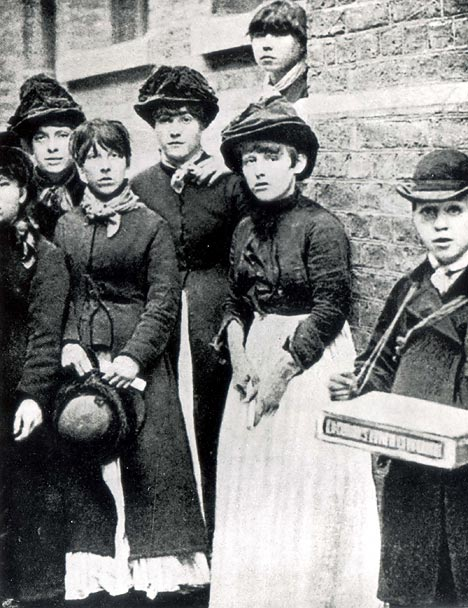
Late nineteenth century society was still fundamentally patriarchal … husbands and fathers held sway over the women in their familial circle, while employers and politicians were still almost exclusively men … this strike stands out as a watershed event in the evolution of feminism, demonstrating that women too could be successful in bargaining with their employers for improved conditions.
Jacqueline Lane
The strike by match-workers at the Bryant and May factory in Bow, East London, in the summer of 1888 was an unprecedented, mass reaction to the appalling working conditions, low wages and illnesses caused by the use of the cheaper white phosphorous in the match-making process. It has been widely chronicled. Much of its notoriety can be attributed to the suffering of its largely women participants, however the strike led to legislative improvements to protect women in the workplace and demonstrated that women could play a key role in gaining important rights through collective workplace bargaining.
Speaking in a House of Commons debate on the strike in October 2013, Diana Johnson MP noted
In 1888, the match women had few rights at work and even weaker rights as citizens—the right to vote was still 30 years away for the first women, and parliamentary democracy as a means of improving the lot of working people was at a far less advanced stage. As women, the match women were frowned on for working at all, even though doing so was a matter of survival. I understand that there was even a sense of shame about working for Bryant & May, which is ironic and poignant, considering how proud of those workers many of us are today.
The match women’s strike has never been given the prominence that it deserves. Their self-organisation has been overlooked and their bravery has never been properly recognised, but if it had not been for them winning their strike in 1888, it is possible that many of us here today, especially the Labour women MPs, would not be Members of Parliament and speaking in the House of Commons.
The full version of this landmark was written by Jacqueline Lane.
Learn More
BBC News, ‘Setting the Workers Alight: the East End Match Girls’ Strike’ (Legacies: UK History Local to You, 13 February 2004) http://www.bbc.co.uk/legacies/work/england/london/article_1.shtml
British Library, ‘History Timelines: Sources from History, Match Girls Strike 1888’ (Reynolds’s Newspaper, 8 July 1888) http://www.bl.uk/learning/timeline/item106451.html
National Archives, ‘White Slavery’ (Power, Politics and Protest: The Growth of Political Rights in Britain in the 19th Century) http://www.nationalarchives.gov.uk/education/politics/g8/